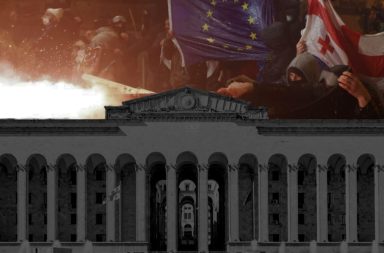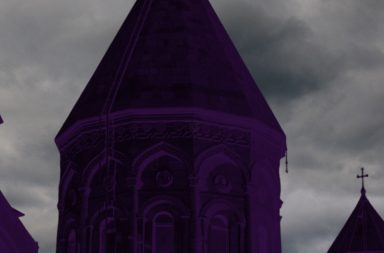by Davit Beglaryan
The toll of two bells
On 21 April 2025, the funeral bells rang over St. Peter’s Square for Pope Francis, the Argentine Jesuit who spent a lifetime preaching mercy while wrestling with his own silence during Argentina’s military dictatorship.
Two months later, the bells of Holy Etchmiadzin rang again — not for mourning, but in protest. Security forces had arrived to detain Archbishop Mikael Ajapahyan, sparking a tense standoff at the Armenian Church’s spiritual center. Dozens of priests and laypeople linked arms, refusing to surrender him. The scene could have been lifted from another time, another regime.
Across half a century and half a world, the same question echoes: When a state feels threatened, how far will it go to silence its priests?
Argentina: The moral fog of the Dirty War
From 1976 to 1983, Argentina’s military junta abducted, tortured, and murdered up to 30,000 people in what it called the “Proceso de Reorganización Nacional” (A slogan very similar to Pashinyan’s slogans in the last 2-3 years). Among the targets: priests who spoke out for the poor.
One of the most famous, Fr. Carlos Mugica (whose last words were: “Now more than ever, we must be with the people.”), was assassinated in 1974, before the junta took power, by the far-right Triple A death squad. His death was an early warning of what awaited clergy who refused to toe the line.
Jorge Mario Bergoglio, the man who would become Pope Francis, was then the Jesuit Provincial. Two priests under his leadership — Francisco Jalics and Orlando Yorio — were kidnapped and held for five months. Critics accused Bergoglio of not doing enough. Later evidence suggested he quietly lobbied for their release. Jalics ultimately forgave him, saying they were reconciled.
But the broader lesson is this: authoritarian regimes fear not just bullets — they fear moral authority.
Armenia 2025: Déjà vu in digital camo
Nikol Pashinyan does not lead a military junta. But his government increasingly borrows from their manual.
Since May 2025, Nikol Pashinyan has launched a direct and coordinated attack on the Armenian Apostolic Church, the world’s oldest national Christian institution. Backed by state resources and loyalist media, this campaign has escalated into open threats, coercion, and orchestrated efforts to depose His Holiness Karekin II, Catholicos of All Armenians.
Key moments:
- May 29 – Pashinyan dismisses many churches as mere “storage rooms.”
- June 8 – He demands Karekin II resigns, citing “moral failure.”
- June 25 – Archbishop Bagrat Galstanyan, leader of the “Tavush for the Homeland” protest movement, is arrested and charged with terrorism.
- June 27 – Riot police arrive at Etchmiadzin to seize Abp. Ajapahyan. Priests and laity block the arrest; bells ring out in defiance.
- Ongoing – Government lawyers continue pushing for a new constitution that would very likely strip the Church of its protected constitutional status (Articles 17–18).
It’s a campaign of legal, rhetorical, and physical pressure meant to do what batons alone cannot: silence the one institution whose voice still commands deep loyalty.
Why this comparison isn’t cheap
- Moral authority frightens weakened regimes.
In 1970s Argentina, a sermon could draw more loyalty than a general’s decree. In 2025 Armenia, Sunday liturgy still outranks press conferences in public trust. - Silencing starts with smear, ends with shackles.
Argentina’s junta called dissident priests “subversives.” Armenia now calls them “traitors,” “oligarchs,” or “terrorists.” Once the label sticks, the cuffs follow. - A reckoning never stays buried.
Argentina’s trials came decades later—but they came. Armenia’s rulers should ask themselves how long impunity really lasts.
An Easter-Monday warning
Pope Francis died this April having transformed global Catholicism and largely redeemed his youthful silence. His final lesson? The Church must speak even when the powerful want it mute.
Armenia’s Apostolic Church, founded in 301 A.D., has survived genocide, Soviet atheism, and exile. It will likely survive one more political storm. What remains unknown is the price the nation will pay: social fracture, lost identity, or deepened geopolitical compromise.
In Buenos Aires, the junta thought a crucifix could be caged. They miscalculated.
In Yerevan, the government may find that a bell silenced by force rings louder in memory than it ever did in metal.


